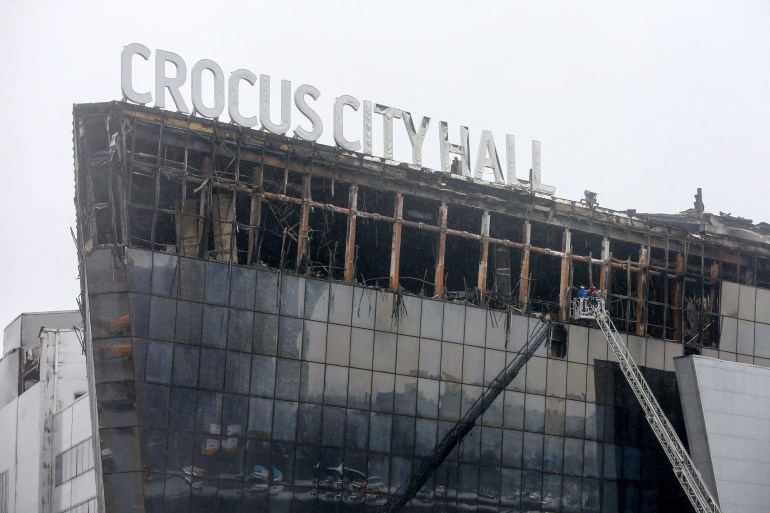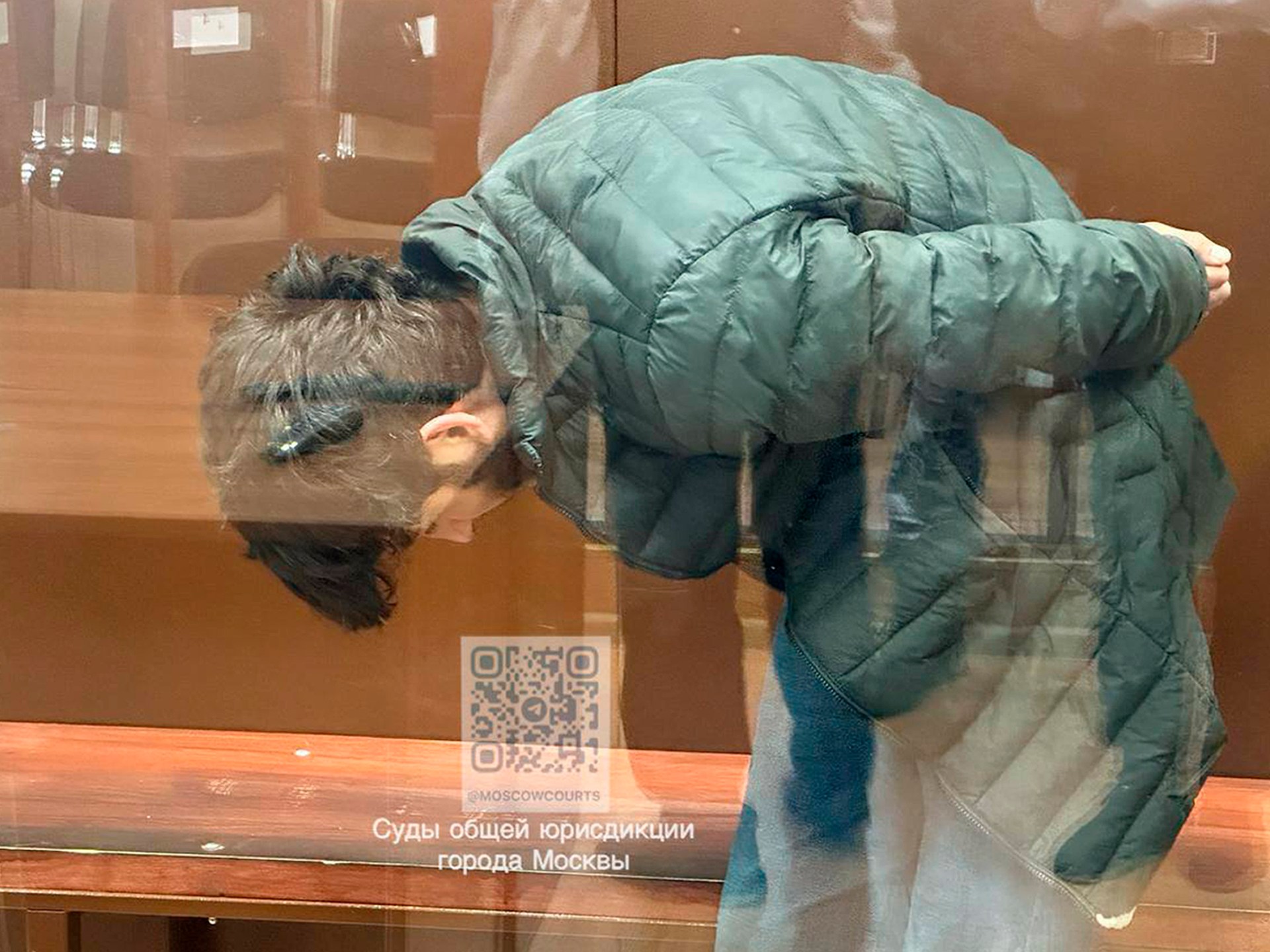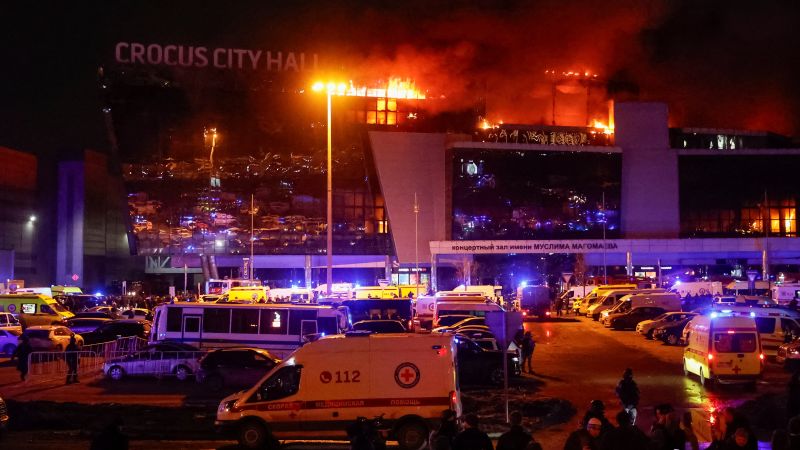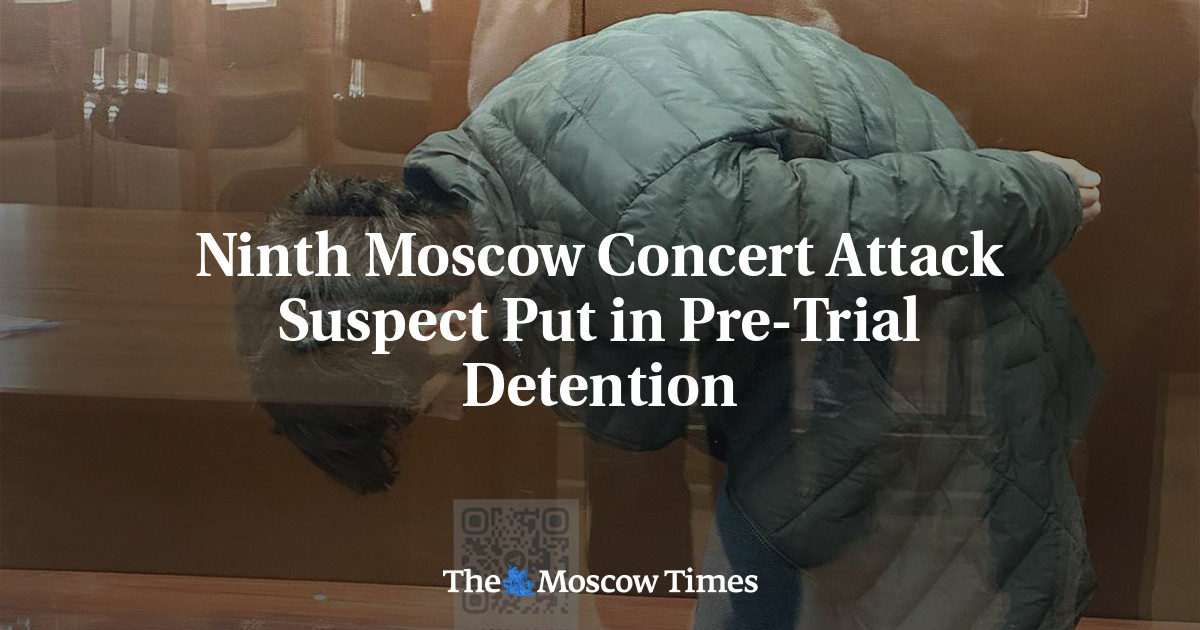MOSCOW (AP) — Nine people have been detained by Tajikistan's state security service over suspected contact with the perpetrators of last week's attack on a suburban Moscow concert hall that killed 144 people, Russian state media reported. The four suspected attackers were arrested and identified as Tajik nationals. An affiliate of the Islamic State group claimed responsibility for the attack, which was the deadliest on Russian soil in years.
Tajikistan Detains Nine Over Moscow Concert Hall Attack Suspected Links
Moscow, Russia Russian FederationNine individuals have been arrested by Tajikistan's state security service for suspected contact with the perpetrators of last week's attack on a suburban Moscow concert hall that killed 144 people.
Tajikistan detains nine people over Moscow Concert Hall Attack Suspected Links
The four suspected attackers were identified as Tajik nationals and an affiliate of the Islamic State group claimed responsibility for the attack, which was the deadliest on Russian soil in years.




Confidence
70%
Doubts
- It is not clear if the suspects are directly linked to the attack or simply associated with individuals who were.
- The source of this information should be verified before making any conclusions.
Sources
76%
Central Asian migrants face xenophobic backlash in Russia after Moscow terror attack
CNN News Site: In-Depth Reporting and Analysis with Some Financial Conflicts and Sensational Language Sebastian Shukla Saturday, 30 March 2024 04:00Unique Points
- The four men accused of the deadly terror attack on Moscow's Crocus City Hall last week were identified as being from Tajikistan.
- Russians are understandably shocked and saddened by the attack, but in the days since that emotion combined with disturbing videos appearing on Russian social media channels of police brutally abusing alleged attackers has unleashed a wave of xenophobia from some towards Central Asian migrant workers in general.
- On X, CNN saw posts asking for taxis to be cancelled if the driver was Tajik and one purported photo showed a conversation where someone said 'If you are Tajik, please cancel my ride.'
- A torrent of abuse has also been directed towards a barbershop in Ivanovo where one of the alleged attackers worked. The owner of the shop told Russian journalists that her phone had been ringing non-stop with death threats and is quoted as saying 'I'm pregnant and I don't know what to do. I'm afraid to go outside.'
- Russian President Vladimir Putin now finds himself in an increasingly delicate position regarding migrant workers, who occupy vital roles in the Russian workforce particularly while the country is at war.
- Migrants from Central Asia have traditionally been a valuable source of cheap labor for Russia. Generally they occupied jobs that many Russians feel are beneath them such as taxi drivers, truck drivers or supermarket workers and their remittances were an important driver of growth in their home countries.
Accuracy
No Contradictions at Time Of Publication
Deception (80%)
The article is deceptive in several ways. Firstly, the author claims that all four men accused of the terrorist attack are from Tajikistan when it has not been confirmed yet. Secondly, there have been reports of Russian police brutally abusing migrant workers who were arrested after the attack which contradicts Putin's statement about treating them with respect. Thirdly, some people in Russia are using this incident as an excuse to target and harass Central Asian migrants which is not supported by any evidence presented in the article.- The author claims that all four men accused of the terrorist attack are from Tajikistan when it has not been confirmed yet. This statement is misleading because there have been reports suggesting that some or all of them may be from other countries as well.
Fallacies (85%)
The article contains several examples of informal fallacies. The author uses inflammatory rhetoric and appeals to authority when discussing the attack on Moscow's Crocus City Hall. Additionally, there are instances where the author presents a dichotomous depiction of Central Asian migrants in Russia.- The men had been in Russia as migrant workers on either temporary or expired visas
- Russians are understandably shocked and saddened by the attack. But in the days since, that emotion combined with the disturbing videos appears to have unleashed a wave of xenophobia from some towards Central Asian migrant workers in general.
- A torrent of abuse has also reportedly been directed towards a barbershop in Ivanovo
- Russian President Vladimir Putin now finds himself in an increasingly delicate position with regard to migrant workers, who occupy vital roles in the Russian workforce particularly while the country is at war.
Bias (85%)
The article contains examples of xenophobia directed towards Central Asian migrant workers in Russia. The author does not provide any evidence to support their assertions that the attack was carried out by Tajikistan or other Central Asian countries. Additionally, there is no mention of any bias on the part of Russian authorities or law enforcement agencies.- On the social media platform X, CNN saw posts that showed people looking for taxis, asking for their rides to be cancelled if the driver was Tajik.
Site Conflicts Of Interest (50%)
None Found At Time Of Publication
Author Conflicts Of Interest (50%)
None Found At Time Of Publication
81%
9 detained in Tajikistan in connection with Moscow concert hall attack, Russian state media report
The Associated Press News Friday, 29 March 2024 10:59Unique Points
- . Nine people have been detained by Tajikistan's state security service over suspected contact with the perpetrators of last week's attack on a suburban Moscow concert hall that killed 144 people.
- The four suspected attackers were arrested and identified as Tajik nationals. An affiliate of the Islamic State group claimed responsibility for the attack, which was the deadliest on Russian soil in years.
Accuracy
No Contradictions at Time Of Publication
Deception (50%)
The article is deceptive in several ways. Firstly, it states that the Russian state media reported on the arrests of nine people by Tajikistan's state security service over suspected contact with perpetrators of last week's attack on a suburban Moscow concert hall. However, this statement is misleading because there are no sources cited in the article to support this claim. Secondly, it states that Russian officials previously said that 11 suspects had been arrested and identified four who allegedly carried out the attack as Tajik nationals. This information is also not supported by any sources mentioned in the article. Thirdly, it claims that Russia's Investigative Committee has detained another suspect in relation to the raid on Crocus City Hall, on suspicion of being involved in financing the attack. However, this claim is unsupported and lacks any evidence presented to back up these statements.- The article states that Russian state media reported on the arrests of nine people by Tajikistan's state security service over suspected contact with perpetrators of last week's attack on a suburban Moscow concert hall. However, this statement is misleading because there are no sources cited in the article to support this claim.
- The article states that Russian officials previously said that 11 suspects had been arrested and identified four who allegedly carried out the attack as Tajik nationals. This information is also not supported by any sources mentioned in the article.
Fallacies (85%)
The article contains several logical fallacies. The first is an appeal to authority when it states that the Kremlin has insisted that Ukraine and the West had a role in the attack, without providing any evidence to support this claim. This statement is not based on facts but rather on assumptions made by Russian officials. Another example of an appeal to authority can be seen when RIA Novosti cites an unnamed source from Tajikistan's security services as saying that those detained are suspected of having connections with IS, without providing any evidence or further details about the suspects. This statement is also not based on facts but rather on assumptions made by Russian officials and their sources. The article also contains inflammatory rhetoric when it states that Russia's Investigative Committee has confirmed data that the perpetrators of the terrorist attack received significant amounts of money and cryptocurrency from Ukraine, which were used in preparing the crime. This statement is not based on facts but rather on assumptions made by Russian officials and their sources. The article also contains a dichotomous depiction when it states that Russia's President Vladimir Putin has persistently claimed without presenting evidence that Ukraine and the West had a role in the attack, while Ukraine denies involvement. This statement presents two opposing views without providing any context or explanation for why these views differ.- The Kremlin has insisted that Ukraine and the West had a role in the attack, something Kyiv has vehemently denied.
Bias (85%)
The article contains multiple examples of religious bias. The author uses the phrase 'Islamic State group' to describe the perpetrators of the attack, which implies that all Muslims are responsible for this crime. This is a gross generalization and unfairly taints an entire religion with guilt.- The Islamic State group claimed responsibility for the attack
- those detained in Tajikistan's security services are suspected of having connections with IS.
Site Conflicts Of Interest (100%)
None Found At Time Of Publication
Author Conflicts Of Interest (0%)
None Found At Time Of Publication
70%
Ninth Moscow Concert Attack Suspect Put in Pre-Trial Detention
The Moscow Times The Moscow Friday, 29 March 2024 15:40Unique Points
None Found At Time Of Publication
Accuracy
- The four men accused of the deadly terror attack on Moscow's Crocus City Hall last week were identified as being from Tajikistan.
- Russian President Vladimir Putin now finds himself in an increasingly delicate position regarding migrant workers, who occupy vital roles in the Russian workforce particularly while the country is at war.
Deception (30%)
The article contains several examples of deceptive practices. Firstly, the author claims that Lutfulloi pleaded guilty to some charges without providing any specifics about what those charges were or if there are additional crimes he is accused of beyond terrorism. This statement implies a level of guilt on his part but does not provide enough information for readers to make an informed decision. Secondly, the article mentions that Lutfulloi was arrested on Monday for petty hooliganism in addition to being placed in pre-trial detention for terrorism charges. However, it is unclear if these two arrests are related or if they were made by different courts with different jurisdictions. This ambiguity creates confusion and suggests that the author may be trying to manipulate readers' perceptions of Lutfulloi's guilt. Finally, the article mentions that Russia's Investigative Committee has evidence linking Ukrainian nationalists to the attack but does not provide any specific details about this evidence or how it was obtained. This vague reference creates a sense of mystery and implies that there is more information being withheld from readers.- The article mentions that Lutfulloi was arrested on Monday for petty hooliganism in addition to being placed in pre-trial detention for terrorism charges. However, it is unclear if these two arrests are related or if they were made by different courts with different jurisdictions. This ambiguity creates confusion and suggests that the author may be trying to manipulate readers' perceptions of Lutfulloi's guilt.
- The article mentions that Russia's Investigative Committee has evidence linking Ukrainian nationalists to the attack but does not provide any specific details about this evidence or how it was obtained. This vague reference creates a sense of mystery and implies that there is more information being withheld from readers.
- The article claims that Lutfulloi pleaded guilty to some charges without providing any specifics about what those charges were or if there are additional crimes he is accused of beyond terrorism. This statement creates a sense of guilt on his part but does not provide enough information for readers to make an informed decision.
Fallacies (70%)
The article contains several logical fallacies. The author uses an appeal to authority by citing the Moscow Times as a source without providing any evidence of their credibility or expertise in this matter. Additionally, the author quotes statements from unnamed sources without verifying their accuracy or reliability.- > Moscow's Basmanny District court ruled to keep Lutfulloi in custody until May 22.
Bias (85%)
None Found At Time Of Publication
Site Conflicts Of Interest (100%)
None Found At Time Of Publication
Author Conflicts Of Interest (100%)
None Found At Time Of Publication
77%
Nine detained in Tajikistan in relation to Moscow concert hall attack
Al Jazeera Media Network Al Jazeera Saturday, 30 March 2024 10:31Unique Points
- A Russian court charged one more suspect in last week's deadly attack on Crocus City Hall.
- Tajikistan's state security service has detained nine people for suspected contact with the perpetrators of last week's attack by gunmen on a suburban Moscow concert hall that killed 144 people, Russian state media reported.
- Vakhdat lies east of the Tajik capital, Dushanbe.
- Those detained are also suspected of having connections with ISIL (ISIS), according to RIA Novosti.
- Russian independent news site Mediazona cited Nazrimad as saying in court that he was born in Tajikistan.
- Nazrimad is the ninth suspect to face court.
- Al Jazeera's Dorsa Jabbari, reporting from Moscow, said that 24-year-old Nazrimad was charged with conspiracy to conduct acts of terrorism and pleaded guilty to some of the charges.
- Russia's Investigative Committee additionally said on Thursday that it had detained another suspect in relation to the raid on Crocus City Hall on suspicion of being involved in financing the attack.
- A faction of ISIL has claimed responsibility for the massacre.
- The death toll from the concert hall attack has continued to rise, with the number of deaths increasing to 144 on Friday when a severely injured victim died in a hospital.
- Russian Health Minister Mikhail Murashko confirmed that there were 144 people killed and over 200 others injured in last week's attack.
- The Russian government has imposed martial law around Moscow following the attack, which includes restrictions on public gatherings and increased security measures.
- Russian officials previously said that 11 suspects had been arrested in the country, including four who allegedly carried out the attack.
Accuracy
- The four men accused of the deadly terror attack on Moscow's Crocus City Hall last week were identified as being from Tajikistan.
- Russians are understandably shocked and saddened by the attack, but in the days since that emotion combined with disturbing videos appearing on Russian social media channels of police brutally abusing alleged attackers has unleashed a wave of xenophobia from some towards Central Asian migrant workers in general.
- On X, CNN saw posts asking for taxis to be cancelled if the driver was Tajik and one purported photo showed a conversation where someone said 'If you are Tajik, please cancel my ride.'
- A torrent of abuse has also been directed towards a barbershop in Ivanovo where one of the alleged attackers worked. The owner of the shop told Russian journalists that her phone had been ringing non-stop with death threats and is quoted as saying 'I'm pregnant and I don't know what to do. I'm afraid to go outside.'
- Russian President Vladimir Putin now finds himself in an increasingly delicate position regarding migrant workers, who occupy vital roles in the Russian workforce particularly while the country is at war.
- Migrants from Central Asia have traditionally been a valuable source of cheap labor for Russia. Generally they occupied jobs that many Russians feel are beneath them such as taxi drivers, truck drivers or supermarket workers and their remittances were an important driver of growth in their home countries.
Deception (50%)
The article is deceptive in several ways. Firstly, it states that Tajikistan's state security service has detained nine people for suspected contact with the perpetrators of last week's attack by gunmen on a suburban Moscow concert hall that killed 144 people. However, there is no evidence to suggest these individuals were involved in the attack or had any connection to it. Secondly, the article claims that Russian security forces were also involved in detaining the suspects. This statement is not supported by any information provided and could be seen as an attempt to discredit Russia's investigative committee for their work on this case. Thirdly, there are several instances where statements made by individuals or organizations are presented without context or clarification, making it difficult to determine if they should be taken at face value.- The article claims that Russian security forces were also involved in detaining the suspects. This statement is not supported by any information provided and could be seen as an attempt to discredit Russia's investigative committee for their work on this case.
- The article states that Tajikistan's state security service has detained nine people for suspected contact with the perpetrators of last week's attack by gunmen on a suburban Moscow concert hall that killed 144 people. However, there is no evidence to suggest these individuals were involved in the attack or had any connection to it.
Fallacies (70%)
The article contains several logical fallacies. The author uses an appeal to authority by citing Russian state media and the Investigative Committee as sources for information about the suspects detained in Tajikistan. This is problematic because these sources may not be reliable or unbiased, which could lead to incorrect information being presented in the article.- The RIA Novosti news agency reported on Friday that Russian security forces were also involved in the operation to detain the suspects.
Bias (85%)
The article contains multiple examples of religious bias. The author uses the phrase 'connections with ISIL' to imply that those detained are guilty and have committed a crime without providing any evidence or context for this claim.- Nine residents of the Vakhdat district were detained for contact with the persons who committed the terrorist attack at Crocus City Hall on March 22,
- Russia's Investigative Committee additionally said on Thursday that it had detained another suspect in relation to the raid on Crocus City Hall on suspicion of being involved in financing the attack.
- those nine people are also suspected of having connections with ISIL (ISIS), according to RIA Novosti.
Site Conflicts Of Interest (100%)
None Found At Time Of Publication
Author Conflicts Of Interest (100%)
None Found At Time Of Publication